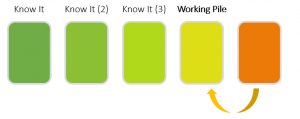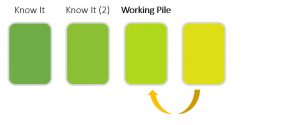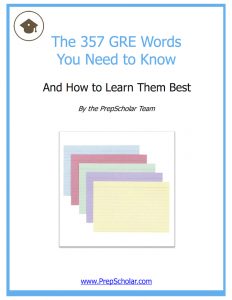
Knowing GRE vocab is essential to doing well on the Verbal section of the GRE. And GRE flash cards are one of the best ways to learn GRE vocab. Luckily for you, we’ve made printable flashcards of the our top 357 GRE vocab words you need to know.
We’ll also discuss why you should use GRE flash cards, the best way to study GRE vocabulary flashcards, and provide reviews of some of the most popular flashcard sets available out there.
Our GRE Flash Cards: 357 Top Vocab Words
For those of you who just want the goods, here’s our GRE flash cards (click the icon):
This document has flashcards of all 357 GRE vocabulary words you need to know. These words were assembled from our own investigation of official GRE practice materials and by synthesizing the vocab lists of other test-prep experts. You can trust that this list is battle-tested and gives you a solid starting point for GRE vocab.
On our flashcards we provide parts of speech and clear, useful definitions for each of the words. We include all definitions for those GRE vocabulary words with multiple definitions.
If you want more info about using GRE vocab flashcards, or want to know more about some of your other flashcard options, read on!
Quick side note: we've created the world's leading online GRE prep program that adapts to you and your strengths and weaknesses. Not sure what to study? Confused by how to improve your score? We give you minute by minute guide.
You don't NEED a prep program to get a great GRE score. But we believe PrepScholar is the best GRE prep program available right now, especially if you find it hard to organize your study schedule and don't know what to study.
Click here to learn how you can improve your GRE score by 7 points, guaranteed.

Why Use GRE Flashcards to Learn Vocabulary?
When you’re trying to learn vocab, why should you use GRE flash cards? Why can’t you just read a list of GRE vocabulary words every day?
Well, here are three reasons to use GRE flashcards to learn vocabulary:
They’re Hands-On
The fact that you have to actually engage with flashcards through flipping and sorting means that you have to really confront the material. If you’re using GRE vocabulary lists, your eyes can just glaze over without your really comprehending the words.
The Order Is Random
The problem with quizzing yourself on a list of vocab words is that the order of the words stays the same! So unless you have someone else quiz you (which is also fine, if that’s something you want to do), flashcards will ensure that the order of the words is changed up. This will keep you from remembering words and definitions based on their order, which won’t help you much on test day.
They’re Effective
Finally and most importantly, they’re effective! Experts have said that the most effective studying strategies are ones where you’re testing yourself with the material. And flashcards are a strategy that have that testing aspect built-in!

The Best Way to Study GRE Flashcards
The best way to study GRE flashcards (or any flashcards) is through the waterfall method. The waterfall method involves working through smaller and smaller subsets of flashcards as you learn the definitions, then working back up through until you’re confident you’ve learned them all. Here’s how it works.
Let’s say that you have 100 GRE vocab flashcards.

First, you’ll go through the cards one by one. For each card where you know the definition easily, you’ll put it in your “Know it” pile, on the left. If you don’t know the definition, put it in your “Struggled” pile on the right.

When you’ve gone through all the words, pick up the “Struggled” pile. Next you’ll go through this pile. For words where you know the definition, place them in a second “Know It” pile next to but not combined with the first “Know It” pile. For words you don’t know, make a new “Struggled” pile.

Repeat this process, placing new “Know It” piles in a row from left to right. This creates your “waterfall.” Repeat this until the “Struggled” pile only has 4-5 words.

Now, you’ll move back up the waterfall. Start with the last “Struggled” pile and go through it until you know all the words in the pile. Then, add the most recent (the rightmost) “Know It” pile.

Go through those words. If you miss any words at any point, go through the entire pile you currently have again until you get all of the words right. Seems brutal, but this will guarantee that you really know the words! Don’t pick up more cards until you can get through the whole pile with no trouble. Continue this process until you get all the way back up the waterfall.

When you’ve reached the top of the waterfall again, you know all the words!
This is the best method to drill GRE vocab flashcards because you study the GRE vocabulary words you don’t know as well many more times than if you just studied the entire stack over and over.
As time goes on, your “Know It” piles will be bigger and your “Struggled” piles will be smaller and smaller, until you don’t even need to waterfall at all!

GRE Flashcard Reviews
There are a lot of GRE flash card resources available out there (including ours!). In this section, we’ll review some of the most well-known flashcards for GRE vocabulary practice.
Magoosh Online Flashcard Application
Price: Free
The Magoosh online GRE flashcard application is like the white bread of GRE flashcard options. It’s pretty bland and inoffensive, and I think students could get some utility out of it, but it’s not the best option out there.
With the Magoosh app, you can drill individual 50-word sets sorted into “common,” “basic” and “advanced” categories.
The order is random within sets of cards, and after you flip a card you check either that you knew the word or you didn’t know the word. If you knew the word, it goes into the “mastered” category. If you didn’t know it, it goes into “learning.” If a “learning” word comes up again and you say that you know it, it goes into the “reviewing” category. Sound a little convoluted? It is.
Want to improve your GRE score by 7 points? We have the industry's leading GRE prep program. Built by world-class instructors with 99th percentile GRE scores, the program learns your strengths and weaknesses through machine learning data science, then customizes your prep program to you so you get the most effective prep possible.
Try our 5-day full access trial for free:
While this system could do for learning some vocab in a pinch, there are a few things about it that prevent me from being able to give a strong endorsement:
- With any online set, you can’t really do the waterfall method. This isn’t a problem specific to Magoosh, but it does mean that an online app has to be really excellent for me to give a strong recommendation.
- Magoosh only gives one definition for each word, even those that have multiple definitions. This does a disservice to you as you may encounter alternate meanings of the word on the GRE!
- Old words you got wrong start appearing before you get through all of the words you haven’t seen, which is a little awkward and disorienting.
- While all of the example sentences on the cards are technically correct, they read a little bit unnaturally, possibly because Magoosh is trying to make the definition overly clear from the context.

Magoosh Printable Flashcards
Price: Free
I’m reviewing the Magoosh GRE vocabulary flashcards printable version separately because the word sets and format are different enough that they really aren’t the same product.
The Magoosh printable GRE vocabulary flashcards have some nice features, but there are some major things about them that are awkward or confusing.
First, it’s nice that they’re printable, because it means you can use the waterfall method! And there’s a robust selection of GRE vocabulary words.
However, the themes of the different GRE vocabulary lists tend to be a little hit-or-miss. For example, a “top ten” list is such a small number of words as to be functionally useless. How could anyone possibly pick a “top ten” out of the hundreds of words that regularly appear on the GRE? However, other lists are based on word origins and bases, which could help you identify patterns that will aid you when you encounter unfamiliar words on the GRE.
Unfortunately, the usefulness of these cards is really undercut by a couple of things. First, all of the cards are written in an awkward and unintuitive fill-in-the-blank format. This makes it hard to really easily connect the word with the definition. Second, the example sentences sometimes use a different form of the word than the one given on the card (i.e. the adverb instead of the adjective) without indicating that’s what they’re doing! So unless you already know the different forms and how to use them, you could be incredibly confused about how to appropriately deploy the word.
There are options for one- and two-sided flash cards. The one-sided flash cards aren’t really flash cards, though, because all of the information is on one side! So someone else would have to quiz you with them for them to be useful.

Memorang Flashcard App
Price: 7-day free trial, $3.99/month or $29.99/year for continued access
I tested out Memorang’s free GRE trial, and I was not hugely impressed. The sets are sorted into “most typical,” “essential” and “expert.” It’s not very clear what the difference between most typical and essential is. The flash card functionality itself is pretty simple: when you drill a set of the GRE flash cards, the words come in a random order within the set, and you can select whether you knew the word or didn’t.
Bizarrely, the opposite side of the flash card isn’t always the definition. Sometimes it’s an example sentence, and sometimes it’s synonyms. The front of the card tells you what you’ll find on the opposite side (definition, sentence, or synonyms). Unfortunately, you can’t select a mode (i.e. all definitions, all synonyms, or all sentences), which severely limits its utility as a study tool. And the sentences aren’t very much like actual GRE sentences.
Overall, I didn’t see anything that impressed me enough in terms of the word selection, definition quality, and app functionality that made me think it’s worth the money. Testing out the trial might give you some words to add to your list, but it doesn’t seem worth it to pay to keep accessing the set and the interface.
Sheppard Software GRE Vocab
Price: Free
Sheppard offers a couple of options with their GRE word lists, including a GRE flash card application, quizzes, and printable word lists.
Honestly, the Sheppard GRE flashcard application is sub-par. Cards appear in a random order from the selected set. The front side of the “card” includes an audio pronunciation component—nice but not necessary for the GRE, really. You click on the card to get the definition. Unfortunately, they are poorly formatted; it’s not always clear where the definition ends and the example sentences begin. There’s also no way to mark if you knew the word or not, so you can’t really track your progress. Overall, this GRE flashcard app has limited utility.
However, the word selection is decent. So if you want to use Sheppard for anything, I would just use the printable word lists to make your own flash cards.
Manhattan GRE: 500 Essential Words and 500 Advanced Words
Price: About $12 each
These are the holy grail of the GRE flashcard world. Word selection is excellent, with vocabulary words from a variety of disciplines and at a variety of difficulty levels. Each card has a ton of info about each word: the definition, a great example sentence, related words, and a “more info” section with interesting facts. All of this information really helps you to learn vocab holistically and not just memorize the words—you’ll be better-equipped to think about how to approach unfamiliar words on the GRE after really spending time with these GRE flashcards (preferably in the waterfall method! I know, I know, I’m a broken record).
Honestly I have nothing bad to say about these except that you have to pay money for them. If you are going to pay for a vocab resource, these are the ones to throw down for.

What Else Should I Do To Learn Vocabulary?
But are GRE vocabulary flashcards all you need to have GRE vocab success? Unfortunately, no. They can help you become familiar with new words and achieve instant recall of a word’s definition(s), which is important. But you also need to be able to define words in context. Basically, you need to know how to use them in a sentence.
To help with this, try reading publications with lots of GRE vocabulary, like the Atlantic, the New York Times, and the Economist. This will help you see how lots of words are deployed in actual writing. You can also use a plug-in for your browser that highlights GRE vocabulary words, like Pervasive GRE for Chrome.
So once you know which GRE vocabulary words you want to learn, you have two necessary prongs of attack. On one hand, you need to memorize the words and definitions with GRE flash cards. On the other hand, you need to make sure you know how the words are used in context by doing some advanced reading on your own.

GRE Flash Cards: Key Takeaways
We’ve made you a printable PDF with 357 GRE vocab flashcards of words you need to know.
If you want to learn vocabulary for the GRE, GRE flash cards are one of the best ways. This is because:
- Flashcards are hands-on, forcing you to engage
- The order is random, preventing you from memorizing based on order
- They’re one of the most effective study tools!
However, you should also be sure that in addition to using flashcards for GRE vocabulary practice you find ways to use the words in context!
The best way to study GRE flash cards is to use the waterfall method. This involves leaving aside cards you know in successive piles to keep drilling the cards you’re struggling with. And then once you go back down the waterfall, you go back up, not picking up a new pile until you’ve fully mastered the one you have!
Want to improve your GRE score by 7+ points?
Check out our best-in-class online GRE prep program. We guarantee your money back if you don't improve your GRE score by 7 points or more.
PrepScholar GRE is entirely online, and it customizes your prep program to your strengths and weaknesses. We also feature 2,000 practice questions, official practice tests, 150 hours of interactive lessons, and 1-on-1 scoring and feedback on your AWA essays.
Check out our 5-day free trial now:
What’s Next?
Need more GRE vocabulary practice? Check out our essential vocabulary PDFs.
If you’re trying to set GRE score goals, check out our guide to what makes a good (and bad) GRE score. And get expert analysis of average GRE scores and what they mean.
Looking for more study resources? Learn about the best GRE books on the market right now and the 4 best GRE question of the day sites—plus how to use them.
Ready to improve your GRE score by 7 points?
We've written a eBook about the top 5 strategies you must be using to have a shot at improving your GRE score.
Download it for free now:


